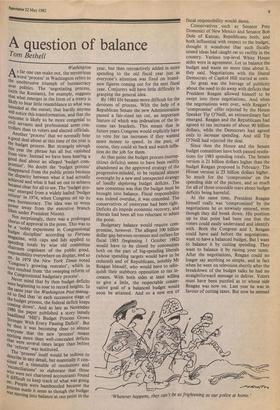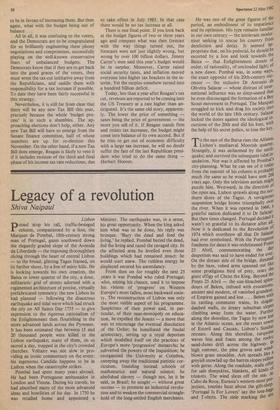A question of balance
TOM Bethel! Washington As far one can make out, the mysterious
word 'process' in Washington refers to the unobtrusive triumph of bureaucracy over politics. The 'negotiating process, (with the Russians), for example, suggests that what emerges in the form of a treaty is likely to bear little resemblance to what was intended at the outset; that hardly anyone
Will notice this transformation, and that the outcome is likely to be more congenial to civil servants and professional arms con-
trollers than to voters and elected officials.
Another 'process' that we normally hear a good deal about at this time of the year is the budget process. But strangely enough this Year the phrase has all but vanished from view. Instead we have been hearing a good deal about an alleged 'budget com- promise'. No doubt the 'budget process' disappeared from the public prints because
the disparity between what it had actually
achieved and what it had set out to achieve became clear for all to see. The 'budget pro- cess' emerged from a widely hailed 'budget reform' in 1974, when Congress set up its own bureaucracy. The idea was to wrest Dower away from the executive branch (then under President Nixon).
Not surprisingly, there was a prolonged chorus of approval in the press. This was to
budget a 'noble experiment in Congressional °Iidget discipline' according to Fortune magazine, with caps and lids applied to spending totals by wise old committee chairmen cognisant of the public good, responsibility everywhere on display, and so °,n. In 1979 the New York Times noted Congress's growing restraint', whiCh in turn resulted from 'the sweeping reform of
the Congressional budgetary process'. Never mind that by then budget deficits were beginning to soar to record heights. In
the same year the Washington Post manag- ed to find that 'at each successive stage of the budget process, the federal deficit keeps coming down'. And as late as November
headlined the paper published a story lamely neadlined 'Hill's Budget Process Grows
Stronger With Every Passing Deficit'. But by then it was becoming clear to almost everyone that the new `process' meant
that hi more than well-concealed deficits . at, were several times larger than before the reform' was instituted. The 'process' itself would be tedious to
describe con- sisted in any detail, but essentially it con- of a timetable of resolutions and
who so elaborate that those
it were not chartered accountants found it difficult to keep track of what was going tIn• People were bamboozled because the _Process made it seem as though the budget was Moving into balance at one point in the
year, but then retroactively added in more spending to the old fiscal year just as everyone's attention was fixed on brand- new figures coming out for the next fiscal year. Conjurers will have little difficulty in grasping the general idea.
By 1981 life became more difficult for the devotees of process. With the help of a Republican Senate the new Administration passed a fair-sized tax cut, an important feature of which was indexation of the in- come tax brackets. This meant that in future years Congress would explicitly have to vote for tax increases if they wanted more money to spend. In the past, of course, they could sit back and watch infla- tion do the job for them.
At that point the budget process (surrep- titious deficits) seems to have been swiftly abandoned as the approved strategy of the progressive-minded, to be replaced almost overnight by a new and unexpected strategy of loudly deploring budget deficits. The new consensus was that the budget must be brought into balance. Fiscal responsibility was indeed overdue, it was conceded. The conservatives of yesteryear had been right. Deficits do impede economic recovery, and liberals had been all too reluctant to admit the point.
Budgetary balance would require com- promise, however. The alleged 100 billion dollar gap between revenues and outlays for fiscal 1983 (beginning 1 October 1982)' would have to be closed by concessions both on the part of big-spending liberals (whose spending targets would have to be reduced) and of Republicans, notably Mr Reagan himself, who would have to relin- quish their stubborn opposition to tax in- creases. With both sides at least willing to give a little, the respectable conser- vative goal of a balanced budget would soon be attained. And so a new era of fiscal responsibility would dawn.
Conservatives such as Senator Pete Domenici of New Mexico and Senator Bob Dole of Kansas, Republicans both, and both influential with respect to the budget, thought it wondrous that such fiscally sound ideas had caught on so swiftly in the country. Various top-level White House aides were in agreement. Let us balance the budget and waste no more time about it, they said. Negotiations with the liberal Democrats of Capitol Hill started at once.
So great was the barrage of publicity about the need to do away with deficits that President Reagan allowed himself to be swept into these negotiations. And when the negotiations were over, with Reagan's `compromise' offer rejected by the House Speaker Tip O'Neill, an extraordinary fact emerged. Reagan and the Republicans had agreed to tax increases of about 90 billion dollars, while the Democrats had agreed only to increase spending. And still Tip O'Neill had rejected the deal.
Since then the House and the Senate budget committees have both passed resolu- tions for 1983 spending totals. The Senate version is 21 billion dollars higher than the budget Reagan proposed in February. The House version is 23 billion dollars higher. So much for the 'compromise' on the spending side of the picture, and so much for all of those crocodile tears about budget deficits being harmful.
At the same time, President Reagan himself really was 'compromised' by the negotiations he so unwisely entered, even though they did break down. His position up to that point had been one that the voters could easily understand and identify with. Both the Congress and 1, Reagan could have said before the negotiations, want to have a balanced budget. But I want to balance it by cutting spending. They want to balance it by raising your taxes. After the negotiations, Reagan could no longer say anything so simple, and in fact when he went on television shortly after the breakdown of the budget talks he had no straightforward message to deliver. Voters must have been puzzled as to whose side Reagan was now on. Last year he was in favour of cutting taxes. But now he seemed 'Whatever happens, they can't be as frightening as our police at home,' to be in favour of increasing them. But then again, what with the budget being out of balance ...
All in all, it was confusing to the voters, and the Democrats are to be congratulated for so brilliantly engineering these phony negotiations and compromises, successfully playing on the well-known conservative fears of unbalanced budgets. The Democrats know that if they are to get back into the good graces of the voters, they must wrest the tax-cut inititative away from the Republicians, and saddle them with responsibility for a tax increase if possible. To date they have been fairly successful in this strategy.
Nevertheless, it is still far from clear that there will be any new Tax Bill this year, precisely because the whole 'budget pro- cess' is in such a shambles. The ap- proaching elections don't help, either. Any new Tax Bill will have to emerge from the Senate finance committee, half of whose members are up for re-election this November. On the other hand, if a new Tax Bill does emerge, Reagan is likely to veto it if it includes recision of the third and final phase of his income tax rate reductions, due to take effect in July 1983. In that case there would be no tax increase at all.
There is one final point. If you look back at the budget figures of two or three years ago and compare what was then forecast with the way things turned out, the forecasts were not just slightly wrong, but wrong by over 100 billion dollars. Jimmy Carter's men said this year's budget would be in surplus. Moreover, Carter raised social security taxes, and inflation moved everyone into higher tax brackets in the in- terim. Yet the surplus somehow turned into a hundred billion deficit.
Today, less than a year after Reagan's tax cut, revenues are reported to be coming into the US Treasury at a rate higher than an- ticipated. It's the same old story, apparent- ly. The lower the price of something taxes being the price of government — the more you sell of it. If Reagan stands firm and resists tax increases, the budget might come into balance of its own accord. But if he tries to get out of economic difficulty with a large tax increase, he will no doubt suffer the fate of the last Republican presi- dent who tried to do the same thing Herbert Hoover.







































 Previous page
Previous page